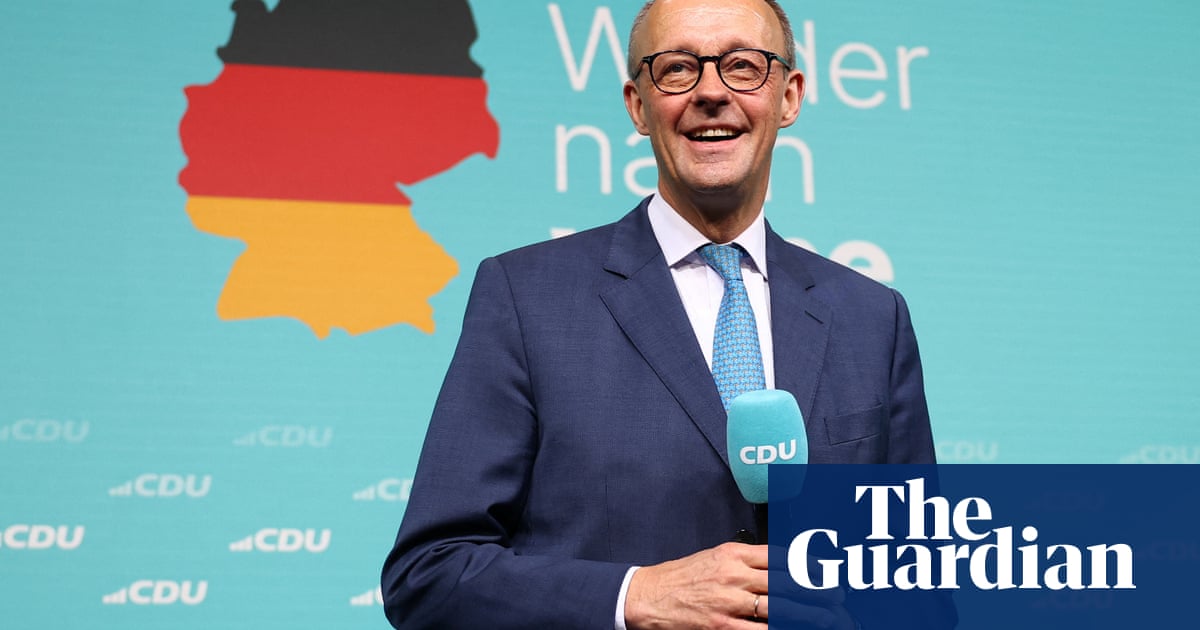The conservative opposition CDU/CSU has won the most votes in Germany’s general election, exit polls indicated, but a surge by the far-right Alternative für Deutschland (AfD) party is likely to complicate the formation of a government ready to help spearhead a European response to new global threats.
The CDU/CSU candidate, Friedrich Merz, appeared best placed to be tasked with forming a ruling coalition on Sunday night after clinching roughly 29% of the vote amid high turnout, according to exit polls released on public television networks.
The AfD, riding popular anger about immigration, violent crime and high energy costs, garnered about 20% of the vote – coming in second place and nearly doubling its result at the last election in 2021.
“This is a historic success for us – our best result ever,” the party’s jubilant chancellor candidate, Alice Weidel, told broadcaster ARD. “We extend our hand to offer cooperation with the CDU. Otherwise change won’t be possible in Germany.”
All the centrist parties, however, have pledged to maintain a “firewall” barring formal cooperation with the anti-migrant, pro-Kremlin AfD, which attracted high-profile endorsements from Donald Trump confidant Elon Musk and the US vice-president, JD Vance, during the short, intense campaign.
The incumbent chancellor, Olaf Scholz, turned in the worst performance for his Social Democrats since the second world war, with about 16%, the exit polls showed. He had led a fractious three-way government until it collapsed in November over a dispute on spending priorities – just hours after Trump’s re-election – triggering the snap German poll seven months ahead of schedule.
Voters also punished Scholz’s junior partners, the ecologist Greens, who slipped a point to 13.5%, and the pro-business Free Democrats (FDP), who the exit polls had teetering on the 5% hurdle to representation in parliament.
The far-left Linke drew more than 8% after a remarkable late-campaign comeback, while a new populist left-conservative party, the Sahra Wagenknecht Alliance (BSW), fizzled out after strong showings in European and state elections last year to tally below 5%.
Merz’s conservatives, who fell far short of an absolute majority, will need to seek an alliance to govern, with the goal of having a new administration in place by Easter. Depending on how many parties win seats when the final results are in – a question now riding on the fate of the FDP – he will either need one or two parties to form a coalition, likely the Social Democrats and possibly the Greens.
Merz, a sharp-tempered corporate lawyer and veteran MP with no experience leading a government, will face a towering in-tray as chancellor, a position he has chased for decades.
Jumpstarting the sputtering economy, grappling with the breakdown in transatlantic relations under Trump and forging a path forward for besieged Ukraine are just a few of the challenges facing Germany, as Europe seeks stronger leadership in a more volatile world.
The mood of the campaign was markedly grimmer than usual, analysts observed, with a sense that the rise of the AfD was keeping the focus on immigration at the expense of other pressing issues such as soaring housing and energy costs and the climate crisis.
A series of deadly attacks with suspects from migrant backgrounds gave the AfD’s Weidel grist for her calls for radical changes to border policy, including mass deportation of immigrants and German citizens deemed poorly integrated, keeping Merz, in particular, struggling to outflank her.
The latest shocking assault came on Friday, when a Spanish tourist was stabbed at Berlin’s Holocaust memorial, allegedly by a 19-year-old Syrian refugee who prosecutors said planned to kill Jews.
“Migration dominated the campaign and going forward, the new government will have to find policies that comply with German law and don’t undermine the EU, which is going to be a huge challenge,” political scientist Aiko Wagner of Berlin’s Free University told the Guardian.
“But the biggest challenge of all is going to be forming a stable coalition that also has the strength to cut the AfD down to size.”
The AfD is set to become the biggest opposition party even while it is under surveillance by security authorities as a suspected extremist force. It has grown steadily more radical since its launch by Eurosceptic professors 12 years ago.
It has also taken direct aim at Germany’s culture of atonement for the Holocaust. During a televised debate last weekend, Weidel explicitly refused to distance herself from remarks by one of the AfD’s founders calling the Nazi period “no more than a speck of bird poo in over 1,000 years of successful history”.
At this month’s Munich security conference, Vance denounced the “firewall” against the AfD as undemocratic in a brazen intervention into the campaign. His remarks drew a strong rebuke from Merz, who pledged to bar the far right from any government he leads.
Merz has offered an action plan to revive the German economy, the world’s third largest, by cutting corporate taxes while expressing openness to reforming the strict “debt brake” that limits federal government annual borrowing to 0.35% of GDP.
But any policy initiatives will have to be agreed by potential partners in what are expected to be protracted coalition talks.
Article by:Source: Deborah Cole













